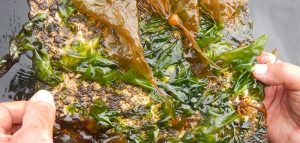
CARTI is repeating a previous kelp survey using the same drone flight path plus an additional section of coastline. This new kelp assessment is to investigate changes in kelp abundance over time. PThis Phase 3 kelp survey will also feature a SCUBA component to provide accurate data on kelp density and biomass, as well as sub-surface observational data.
CAMPBELL RIVER – North Island College (NIC) has received Provincial funding for an innovative seaweed industry pilot project.
Led by North Island College and its Centre for Applied Research, Technology and Innovation (CARTI), the pilot project brings together skills training and new economic-development opportunities to northern Vancouver Island. The Province is supporting the project with $1.2 million over three years.
Developed in collaboration with industry stakeholders and community partners, the program will focus on sustainable seaweed cultivation, processing and marketing, providing people on the north Island with the skills needed to secure jobs in this growing industry. The program aims to create a skilled workforce that will support economic resilience and growth in the region.
The project includes seven micro-credentials and hands-on field training that will be delivered over 18 months, benefiting an estimated 80 participants. Funding will cover students’ full tuition costs, as well as a variety of supports. Registration opens in October with participants starting courses for the winter and spring 2025 semesters.
“Industry-based, real-time learning that enriches the natural abundance of northern Vancouver Island takes a big leap forward with this project,” said Lisa Domae, president, NIC. “NIC is honoured to bring the burgeoning seaweed sector together to advance learning that elevates sustainable economic development in the blue economy.”
The blue economy refers to the sustainable use of ocean resources for economic opportunities, while maintaining the health of marine environments. The seaweed industry will play an important role in this by producing a regenerative agricultural crop with no need for fresh water, arable land or fertilizers.
“The sector is not only expected to provide an important food source in the future, but a source of revenue and employment, so this announcement will help us fill a demand for trained employees that is expected to grow significantly in the coming decades,” said Mark Smith, executive director, Pacific Seawood Industry Association.
Source: Business Examiner Staff & NIC


